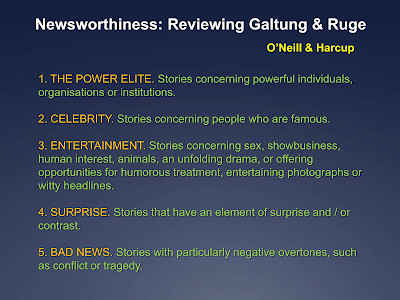News Values:
1. Impact - shock or 'wow' factor
2. Audience identification - interests people
3. Pragmatics - Ethics, practicality, current affairs
4. Source Influence - PR (press release)
These four values seem a good starting point for deciding what story to place at the beginning of TV news or a newspaper. If we look at the headline news for today of the Brisbane Times the two major stories I found were:
- The ongoing investigation into the murder of Brisbane mother-of-three Allison Baden-Clay
- The win of Graham Quirk for Brisbane mayor in last weekend's election
Graham Quirk as the new Brisbane mayor hasn't the 'wow' factor compared to the first story but it is certainly of great importance to the people of Brisbane and a recent affair.
News values have changed and varied over time and were not always those ones shown above. In the lecture we looked at several people's theories as to what makes a story newsworthy. Galtung and Ruge were among the first to come up with a set of values to explain what made headlines. Below are their twelve suggested values.
Galtung and Ruge's three hypothesis:
Additivity Hypothesis - The more factors an event satisfies the higher probability it becomes news
Complementarity Hypothesis - The factors will tend to exclude each other
Exclusion Hypothesis - Events that satsify few or none of the factors will not become news
Golding and Elliot added their thoughts in 1979 with some interesting additions:
- Drama
- Visual attractiveness
- Entertainment
- Importance
- Size
- Proximity
- Negativity
- Brevity
- Recency
- Elites
- Personalities
O'Neill and Harcup have narrowed Galtung and Ruge's intial newsworthiness ideas down to ten suggestions.
Though the 'newsworthiness' of a story has clearly changed over time and even varies from person to person I think we can see some key similarities between them all. Values appear to change rungs on the list rather than appear and disappear entirely. On one of that last lecture slides it was written, 'what do you think is newsworthy?' In my opinion O'Neill and Harcup's version of newsworthiness is the best model and it should be noted that this also is the most modern model I have posted and so relates best to today's news media.
Here is my list in descending order of what I think the news values of today are:
- Impact/ Magnitude - Who and how many people it effects
- Importance - Stories that are relevant to the audience
- Proximity - How close it is to the audience
- Recency - How recent the story is
- The Elite - Concerning the powerful, influential
- Surprise - A stories shock value
- Entertainment - How much it entertains
- Celebrity - Stories about the famour
- Negativity - Conflict and tragedy
- Good News - Positive overtones that make the audience feel good











 Respect
for truth and the public's right to information are fundamental
principles of journalism. Journalists describe society to itself. They
convey information, ideas and opinions, a privileged role. They search,
disclose, record, question, entertain, suggest and remember. They inform
citizens and animate democracy. They give a practical form to freedom
of expression. Many journalists work in private enterprise, but all have
these public responsibilities. They scrutinise power, but also exercise
it, and should be accountable. Accountability engenders trust. Without
trust, journalists do not fulfil their public responsibilities. Alliance
members engaged in journalism commit themselves to
Respect
for truth and the public's right to information are fundamental
principles of journalism. Journalists describe society to itself. They
convey information, ideas and opinions, a privileged role. They search,
disclose, record, question, entertain, suggest and remember. They inform
citizens and animate democracy. They give a practical form to freedom
of expression. Many journalists work in private enterprise, but all have
these public responsibilities. They scrutinise power, but also exercise
it, and should be accountable. Accountability engenders trust. Without
trust, journalists do not fulfil their public responsibilities. Alliance
members engaged in journalism commit themselves to 




